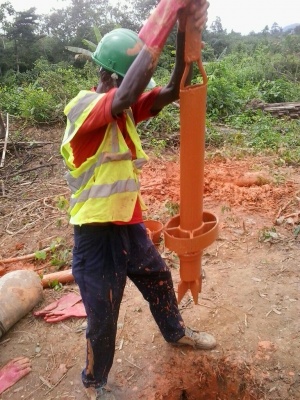Tekyekrom
Tekyekrom is situated on the Dunkwa-Obuasi road. We will drill holes on 3 locations there. EcoSan Ghana already found water on Location 1, using the FloFlo. See a video of the drilling on YouTube. We had to give up drilling on Location 2, because the water table was too low for a standard waterpump.
.
The FloFlo
The FloFlo is an ancient drilling tool, modernised by dutchman Floris de Vos in 2011 (see Facebook page) The FloFlo employs a hoist using a three legged tower. The drillbit is repeatedly hoisted and released to pulvarise the hard soil as it hits the ground. Once a substantial amount of soil has been pulvarised, the drillbit is replaced by the bailer, equiped with a valve, to pull out the soil. Thus it is a manpowered drill tool. Anyone can do it, and it is cheap and efficient.
.
The First Phase
Location 1 - The crew started working on September 14, 2016 (Bismarck, Akwasi Adea, Kojo Amoah, Dominic Asante, Yaw Fosu). The kontihene (head of the elders in the village) stopped by for inspection and some motivational words. After 2 days they had drilled 13 feet deep. On the third day (16/09), at a depth of only 17 feet, water was found. Two more days of drilling gave way to a depth of 28 feet (19/09/2016).
On location 2, after the first day (20/09) the hole was 8 feet deep. Then 16.4 feet (21 and 22/09), 20 feet (23/09), 24 feet (24/09), 27 feet (26/09), 31.4 feet (27/09), 35 feet (28/09), 38 feet (29/09), and 43 feet {30/09 and 01/10) respectively. When the water table is this low, a standard waterpump will not suffice. Due to the remoteness of this location a solar powered pump is not an option, since the panels probably will be stolen at some point.
.
Costs
The first phase on location 1 cost 5 days of work, 1250 cedi (€284,-). For the second phase, we need casing pipes. We bought 100 meters of casing pipe in China; total costs including shipment and bank transfer fee: €1,171.95. We need to wait to know the local (from Tema port to location) transport costs, after which we can calculate the total costs per meter (€11.72/m so far)
The first phase on location 2 cost 11 days of work, 2750 cedi (€625,-), plus the costs for safety boots (240 cedi= €54,-). So, basically, we spend €660,- in vain. At least some poor farmers had a decent income for a few weeks.

























